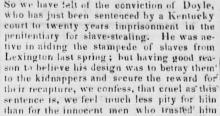Caught in his own Trap.
With all our abhorrence for the gallows, we never pitied Human as much as the tenderest mercy might prompt; but we have thought, ever since we read his history when a little child, that if any body must be hanged, we could not complain of the selection. So we have felt of the conviction of Doyle, who has just been sentenced by a Kentucky court to twenty years imprisonment in the penitentiary for slave-stealing. He was active in aiding the stampede of slaves from Lexington last spring; but having good reason to believe his design was to betray them to the kidnappers and secure the reward for their recapture, we confess, that cruel as this sentence is, we feel much less pity for him than for the innocent men who trusted him as their friend, and whose ruin he had planned, and whose fate is more dreadful than his. We hope in his confinement that he may learn to value liberty for others as well as himself. The treachery and wickedness of his act can scarcely be overrated. To win their confidence––excite their hopes of liberty––hold to their lips the delicious draught of the waters of Life, and just as they had tasted it, dash it to the earth and hurl them again into slavery, to suffer new agonies and keener anguish––it seems diabolical. If a devil could do worse than this, he must have an inventive genius beyond human conception. How must a man's moral nature have been wrecked––the milk of human kindness turned to venom in his heart––the God within have been dethroned, by insatiate avarice, before he could coolly plan and execute such an act. Yet that man so deformed and degraded, is really more an object of pity, than the slave he betrays. In our indignation at his deed, it is hard to turn our hatred from him; we are too apt to forget that he is our brother still, and with a pure and good culture he might have been a blessing to himself and the world, and that, wrecked as he is, he may yet become good, and make his life useful and happy. But this is as true of him, as of thousands of others, slaveholders, and other criminals, around us, and while we feel that his act deserved the punishment which tyrants in cruelty are inflicting, our worst wish for him as for them is, that they may repent and know the joys of a noble and true life, and a more perfect liberty than they can ever enjoy while enslaving their brothers.
Can any one inform us whether this Doyle is the same man who attempted to start a kidnapper's paper in Carlisle, some years since, and afterwards kidnapped a colored woman at Hoguestown, and attempted to sell her in Baltimore as his slave? The similarity of the name, character, and business, has led us to suspect that he is the same person. ––Pa. Freeman.
"Caught in His Own Trap," New Lisbon (OH) Anti-Slavery Bugle, November 17, 1848, p. 3

